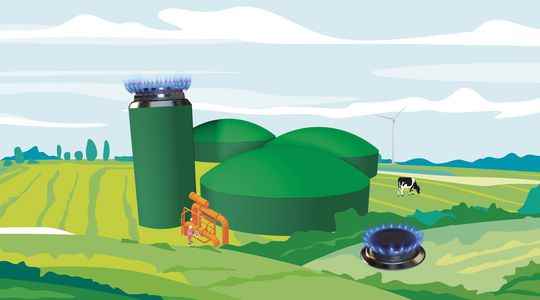Green and yet contested: such is the story of anaerobic digestion… This process aimed at generating carbon-free gas from the degradation of organic matter has flourished in the French countryside in recent years. Projects are multiplying, arousing the excitement of local residents who fear the presence of methanizers near their homes. These installations on the edge of towns or villages are rejected by the inhabitants who refuse their noise and olfactory nuisance.
Yet it is a response from the agricultural world to the imperatives of the energy transition and to societal expectations. The same people who defend carbon neutrality and local employment sometimes turn out to be the ones who can’t stand the noise and the smell. These neighborhood problems reveal the extent to which measures in favor of the climate and the challenge of reindustrialization are strewn with multiple pitfalls. Doubtless, moreover, that methanizers testify more broadly to a state of society where two dynamics are mutually opposed: living together and doing together.
Let’s explain. The French love their farmers. But especially when they don’t live too close to them. Some of their critics forget their essential role and their contribution to our food security, higher than ever. There is no question here of denying that agriculture (including forestry) is still responsible for 20% of the country’s CO2 emissions. But the volume of these emissions has dropped by 10% since 2000. This is insufficient but far from negligible. The agricultural worlds, in their great diversity, strive to contribute to the fight against climate change, by modifying their practices, reducing inputs and storing carbon. With anaerobic digestion, they also participate in efforts relating to the decarbonization of gas and therefore to the energy transition.
Agriculture at the forefront of transition
Far from being foreign to the production of low-carbon energies, agriculture is at the forefront. While its share in total final energy consumption in France is around 3%, it rises to 20% for renewable production in the country. Agriculture needs energy but generates a lot of it, and especially green! More and more farms are involved in this movement, now known as energy farming. These include biofuels and wind power, the overwhelming majority of which produced in France is received on agricultural soils, with 95 and 80% respectively. Agrivoltaism, for its part, enables the sector to supply 15% of the national solar energy.
Anaerobic digestion comes from 30% of farmers. The loop is several times virtuous. The use of plant and animal waste from agriculture to produce energy also produces heat, which can be used for homes in neighboring municipalities. Who can warm up without worrying about whether or not Russia will close its taps to Europe. At this stage, it should also be noted that methanation seems more concrete and easier to support than the hydrogen sector, which is nevertheless lenited. Finally, it should be emphasized that this energy produced and sold generates additional income for farmers who really need it.
Beware of usage conflicts
It should be remembered, however, that these dynamics cannot be exclusive: energy production cannot completely replace the nourishing vocation of agricultural activity. Balances must be found according to territories and access to biomass, which will be highly coveted in the future for use in biofuel. Likewise, it would be damaging to see energy giants appropriating this green power to the detriment of the interests of farmers. This is also what doing it together: thinking constantly about interactions with each other to aim for collective and coherent progress.
Yes the impact on the landscape is real, like any industry. But the factory of the future is already there and does not look like that of past centuries. Yes the noise and the smell are realities, but we must be aware that to produce better, greener and closer, we must accept the physical reality of the transition. Add to that the variable of maintaining local jobs, thanks to these multifunctional farmers, who are often rare lifeblood in rural areas where people sleep in the evenings and on weekends. Defending the transition means learning to rediscover agriculture and understanding that to change trajectory, goodwill is better than sterile opposition.
